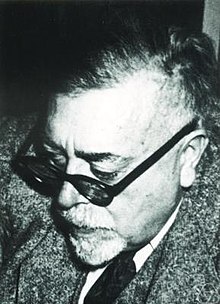Norbert Wiener
| Norbert Wiener | |
|---|---|
 |
|
| Born |
November 26, 1894 Columbia, Missouri, U.S. |
| Died | March 18, 1964 (aged 69) , Sweden |
| Nationality | American |
| Fields |
Mathematics Cybernetics |
| Institutions | Massachusetts Institute of Technology |
| Alma mater |
Tufts College, B.A. 1909 Harvard University, Ph.D. 1913 |
| Doctoral advisors | Karl Schmidt Josiah Royce |
| Doctoral students |
Amar Bose Colin Cherry Shikao Ikehara Norman Levinson |
| Known for |
|
| Notable awards |
Bôcher Memorial Prize (1933) National Medal of Science (1963) |
Norbert Wiener (November 26, 1894 – March 18, 1964) was an American mathematician and philosopher. He was a professor of mathematics at MIT. A famous child prodigy, Wiener later became an early researcher in and mathematical processes, contributing work relevant to electronic engineering, electronic communication, and control systems.
Wiener is considered the originator of cybernetics, a formalization of the notion of feedback, with implications for engineering, systems control, computer science, biology, neuroscience, philosophy, and the organization of society.
Wiener was born in Columbia, Missouri, the first child of Leo Wiener and Bertha Kahn, Jews of Polish and German origin, respectively. Leo had educated Norbert at home until 1903, employing teaching methods of his own invention, except for a brief interlude when Norbert was seven years of age. Earning his living teaching German and Slavic languages, Leo read widely and accumulated a personal library from which the young Norbert benefited greatly. Leo also had ample ability in mathematics and tutored his son in the subject until he left home. In his autobiography, Norbert described his father as calm and patient, unless he (Norbert) failed to give a correct answer, at which his father would lose his temper.
He became an agnostic.
...
Wikipedia
